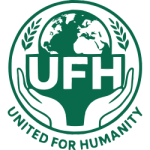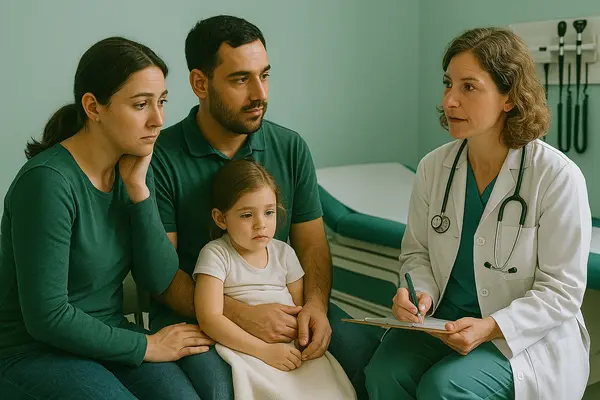When serious illness strikes a family—be it cancer, chronic disease, or life-threatening injury—the physical, emotional, and financial strain can be overwhelming. For displaced families and refugees, these challenges are magnified by language barriers, unfamiliar health systems, and limited resources. At United for Humanity (UFH), we understand that timely medical aid is not merely a service—it’s a lifeline. Through our comprehensive Health Access program, we partner with clinics, hospitals, and volunteer professionals to ensure that families facing serious illness receive the treatment, support, and hope they deserve.
The Unique Health Challenges of Displacement
Refugees and forcibly displaced families confront a range of obstacles when seeking medical care:
Legal and Administrative Hurdles: Unfamiliarity with local health insurance systems and residency requirements often delays access.
Language & Cultural Barriers: Without interpreters, critical information about diagnoses and treatment plans can be lost or misunderstood.
Financial Hardship: Out-of-pocket costs for consultations, medications, and procedures can quickly bankrupt families who have already lost homes and livelihoods.
Psychosocial Stress: The trauma of displacement exacerbates the emotional toll of serious illness, affecting adherence to treatment regimens.
Recognizing these intersecting challenges, UFH’s Health Access program is designed to reduce friction at every stage—from diagnosis through long-term follow-up.
UFH’s Four Pillars of Medical Support
Navigation & Advocacy
Health System Orientation: Trained caseworkers guide families through registration, insurance enrollment, and appointment scheduling.
Legal Advocacy: When needed, UFH attorneys assist with paperwork for emergency health coverage, appeals, or waivers in public health systems.
Financial Assistance
Medical Grants: Means-tested grants cover co-payments, diagnostic tests, and essential medications.
Pharmacy Partnerships: We negotiate discounted drug pricing with local pharmacies and arrange direct dispensing of chronic-care medications.
Clinical Partnerships & Volunteer Network
Pro Bono Specialists: UFH maintains a roster of volunteer physicians, nurses, and allied health professionals who dedicate clinic hours or telemedicine slots for UFH referrals.
Hospital Alliances: Memoranda of understanding with regional hospitals prioritize UFH-sponsored patients for surgeries, imaging, and specialized therapies.
Holistic Psychosocial Care
Counseling Services: Licensed counselors provide individual and family therapy to address the emotional impact of serious illness.
Support Groups: Peer-led groups create safe spaces for sharing experiences, coping strategies, and encouragement.
Real-Life Restorations of Health
Case Study 1: Rebuilding after Diagnosis—The Al-Kamali Family
Background: When eight-year-old Lina was diagnosed with acute leukemia shortly after her family resettled in France, her parents were overwhelmed. Limited French proficiency and no insurance left them unsure how to proceed.
UFH Intervention:
Assigned a bilingual caseworker who coordinated Lina’s registration in the national health system and secured emergency coverage.
Provided a medical grant covering bone-marrow biopsy and chemotherapy co-payments.
Paired the family with a volunteer child psychologist to support Lina through treatment.
Outcome: Lina completed her induction therapy on schedule, and her parents feel empowered to manage follow-up care. Today, Lina is in remission and back at school.
“We thought our world had ended. UFH helped us find the path back to life.”
Case Study 2: Crossing Borders for Critical Surgery—Mr. Novak’s Journey
Background: Mr. Milan Novak, a former engineer from Serbia, developed a congenital heart defect that required specialized valve repair surgery unavailable locally in his host region.
UFH Intervention:
Identified and liaised with a partner cardiac center in Austria willing to perform the procedure pro bono under UFH sponsorship.
Arranged transportation, lodging for Milan and his daughter, and interpreter services for the hospital stay.
Covered postoperative medications and follow-up telehealth consultations for six months.
Outcome: The surgery was successful; Milan’s cardiac function normalized, allowing him to return to work and support his family.
“Thanks to UFH, I have a second chance at life—and I’ll never take a single heartbeat for granted.”
Measuring Our Impact
Since rolling out our Health Access program in late 2022, UFH has:
Served Over 1,100 Individuals from more than 30 countries facing serious health conditions.
Distributed €450,000+ in Medical Grants to cover treatments, procedures, and pharmaceuticals.
Facilitated 320 Pro Bono Consultations with volunteer specialists across 15 disciplines.
Achieved an 87% Treatment Adherence Rate among program participants, compared with a baseline of 54% in self-navigated cases.
These metrics demonstrate not only lives saved but also the restoration of dignity and hope in families under extraordinary stress.
Expanding Care: UFH’s Roadmap for the Future
To meet evolving needs, UFH plans to:
Launch Mobile Health Clinics: Deploy fully equipped vans offering diagnostics, vaccinations, and chronic-care follow-ups directly in refugee communities.
Develop a Telehealth Platform: Integrate multilingual interfaces, secure messaging, and remote monitoring tools to maintain continuity of care regardless of location.
Strengthen Mental Health Services: Train refugee peer counselors and expand group therapy programs focused on coping with chronic illness and displacement trauma.
How You Can Support “Healthy Beginnings”
Your involvement can ensure that no family is left without access to critical medical aid:
Donate to Our Health Fund: Your gift translates directly into grants, medicines, and specialist fees.
Volunteer Your Expertise: Medical professionals can join our pro bono network to provide teleconsultations or in-person clinics.
Advocate for Policy Change: Encourage local health authorities to adopt refugee-inclusive policies and recognize the right to care for displaced populations.
Visit ufh.info/humanitarian-aid/medical-support to learn more and make a difference today.
Conclusion
Access to timely, high-quality medical care is a fundamental human right—especially for families uprooted by conflict, disaster, or persecution. Through our Health Access program, UFH stands at the intersection of compassion and expertise, ensuring that serious illness does not become a sentence but rather a chapter in a story of resilience and renewal. Together, we can give every family the healthy beginning they deserve.


